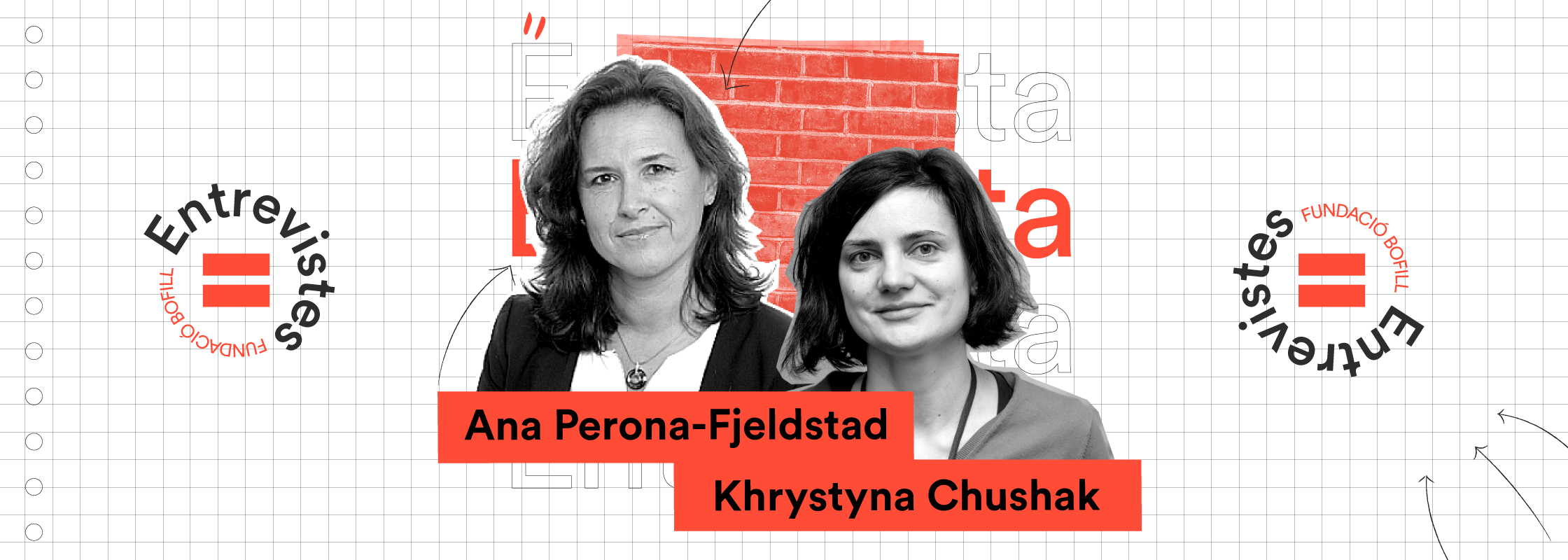“Strengthening youth’s democratic resilience in these times of great uncertainty is paramount.”
20/10/2023

INTERVIEW
Catesco interviews Ana Perona-Fjeldstad, Executive Director, and Khristyna Chushak, Head Programme Coordinator Ukraine of The European Wergeland Centre tell us about the shared challenges between European countries regarding the difficulties linked to building and sustaining a culture of democracy and human rights in a context of clear democratic regression, which the Council of Europe itself has denounced in its annual report this year (coe.int, 5/12/2023).
Both were in Vic participating in the International Workshop Democratic education: the pending innovation organized by the GREUV and theGRAD of UVic-UCC, the Càtedra de Renovació Pedagògica UdG-Can Trona, Antigone-Information and Documentation Centre on Racism, Ecology, Peace and Non-Viοlence and Catesco.
The European Wergeland Center (EWC) is a resource centre on education for intercultural understanding, human rights and democratic citizenship established in Oslo, through an agreement between the Council of Europe and the Norwegian government in 2008. The EWC main aim is to strengthen the capacity of individuals, educational institutions and educational systems to build and preserve a culture of democracy and human rights, through research and project development. The centre serves the 46 member states of the Council and works directly in over 22 of them.
When talking about democratic education and education for human rights, it can be difficult to land these abstract concepts in a classroom, they are far too weighty for us! How do you go about bridging this gap between theory and practice?
Bridging the gap between theory and practice can be a challenge, but there are several strategies that can help to make abstract concepts, like democratic education and Human Rights, more tangible in the classroom.
Most importantly, education professionals should bring democracy into their everyday practice. Schoolchildren need to live in democracy in order to see the practical implications of democratic principles. It is best if teachers and school administration model democratic practices by giving students a say in how they learn and by involving them in decision-making processes. This will contribute to creating and maintaining a culture of democracy in a classroom and in a school.
It is necessary to model democratic practices by giving students a say in how they learn and by involving them in decision-making processes of the school itself.
How can teachers introduce democratic and Human Rights education in schools and classrooms?
Using experiential learning, i.e., engaging students in learning activities that allow them to practice the skills and behaviors associated with democratic education and Human Rights, is an important part of real-life modeling of democratic culture. A good example here are real and regular elections to student councils, based on democratic procedures, which should also be discussed with the students. Such discussions encourage students to think critically about the concept of democracy and to explore different perspectives. This can help them to develop a deeper understanding of the issues and to become more active and engaged citizens.
Teaching about democracy in contemporary societies should be open to dealing with various controversial issues both in school and class settings. It is easier to start with debates and discussions on topics that are the most polemical in society. However, for better results it is important to include dealing with controversies in real life of schools. Nonetheless, many schools are not the best examples of democratic culture (we hope, yet). In such situation teachers, who believe that teaching about democracy and human rights is essential and cannot be limited to a specific subject, can act on their own, implementing some of these elements. They can connect concepts of democracy and human rights to students' experiences (at school or outside it). This will help students to contextualize the concepts and make them more relevant. Also providing concrete real-world examples of democratic processes or human rights issues, and discussing them with your students helps to illustrate the concepts in a way that is more relatable and easier to understand.
Democratic education can be done in any subject and is best done not through lectures, but using interactive methods.
All of this can be done in any subject and is best done not by lecturing, but by using interactive methods or democratic pedagogy approaches and reflections (debriefing) afterwards. Thus, by small steps teachers can contribute to building democratic culture in their classrooms and bridge a gap between theory and practice for their students.
What is the impact of introducing democratic and Human Rights education in schools?
Citizenship education is part of the curriculum of all European countries, either with a transversal approach and/or as a subject. In our experience, when educators use participatory student-centered methods they experience concrete results quite fast: they see motivated students who feel listened to and are willing to engage, discuss and take part. The learning environment improves, and schools thrive. An education institution reflecting democracy in practice is more effective and inspiring for both students as well as educators. It works, and in turn it motivates teachers, students and parents to engage further.
The European Wergeland Centre works in 22 different countries, what are the common challenges you encounter?
“The backsliding of democracies” has become a well-known topic of discussion. We are talking about two types of threats, from within the system: more polarization, discrimination and growing inequality giving way to frustration and apathy. As well as threats coming from authoritarian forces from outside, which are taking ahead massive disinformation efforts towards certain countries and segments of the population.
There is no manual for navigating times like these. Europeans (and beyond) have faced several crises during the last years: the pandemic and its strain on physical and mental health, wars with its humanitarian crisis and millions of refugees, climate crisis, global energy crisis, a long list combined. Young people are, inherently, in the middle of it all. Strengthening youth’s democratic resilience in these times of great uncertainty is paramount: their democratic competences as well as the inner confidence that they have what it takes to take part and trust that society is open to change. We need to fight apathy. Schools have a very important responsibility: preparing young people to be active citizens, able and willing to engage in their diverse societies.
Strengthening the democratic resilience of young people, their democratic skills and their confidence in these times of great uncertainty, is essential.
In many countries, even when citizenship is central in the curricula, it is still too theoretically oriented, there is little connection to student’s everyday life, as mentioned before. This needs to change and teachers ought to be better equipped to deal with a new number of issues they were not prepared for at University: how to deal with AI, media literacy in the digital arena, how to deal with controversial issues (old and new ones) in the classrooms… They need training, and re-training. Thus, it is necessary to take into account that most educators prefer peer-learning for their own professional development, therefore facilitating arenas for exchange of experiences should be prioritized and recognized by the educational systems (now it is not the case in many countries).
Besides capacity building of teachers, we also see a need to improve home-school cooperation and the engagement of parents in schools and, in general terms, cooperation with other actors in the communities where schools are located. Schools cannot be isolated from their communities but in many countries there are still high walls between them, maybe because there is little tradition of opening up schools to other local actors, not too much trust maybe?
The facilitation of spaces for the exchange of experiences for teachers should be prioritized and the value of these spaces within educational systems should be recognised.
How do the sociopolitical context and the characteristics of the education system of a country affect the approach to democratic education in the schools and vice versa?
Schools do not operate in the vacuum, they are affected by their context and the values embedded in their communities. Citizenship education is often reflected as a guiding principle of the education system. And in many cases it remains as an abstract principle, unfortunately. Traditionally, democracy at school has been more often connected to learning about governance and institutions, more than to a culture, a set of values permeating our everyday life. This creates a distance. Educating for democracy means creating the links to our everyday lives, and for students to learn and practice at school from a very early age. It is about knowledge and critical understanding, values, attitudes and skills, always a process in the making: dynamic and participative.
Educating for democracy means creating links with our everyday lives, and learning and practicing democracy in school from an early age in a dynamic and participatory process.
How do you evaluate the work done in Ukraine prior to the war? How has your approach changed since it started?
EWC has worked in Ukraine since 2013. We have contributed to the comprehensive democratic reforms in education that have rolled out after the Revolution of Dignity of 2014. Before the war, the whole educational landscape in Ukraine had changed: schools gained a broad autonomy, a new competence-based national curriculum was launched at main levels of education at school and early childhood education and new approaches to school assessment opened for a higher quality of school education.
Before the war, from the EWC we focused on institutional capacity building of schools, namely support of democratic school development based on the whole school approach. Over 400 schools from all over Ukraine were supported before 2022. Schools drafted plans for development, participated in the training and implemented projects and evaluated changes throughout 18 months in the project. EWC supported schools in this process and provided them with training.
Successful efforts like establishing well-functioning student councils, developing democratic governance at schools, or encouraging active participation of students in the local community, before the war, helped many schools develop a vigorous school community with strong horizontal ties, which helped these schools to better respond to challenges caused by war.
The improvements in democratic education achieved before the war have created a vigorous school community with strong horizontal links, which is helping many schools to better respond to the challenges brought by the war.
After the war started, more focus was laid rather on capacity building of teachers and individual tutoring. Over 120.000 teachers participated in the online courses developed by the EWC. The topics varied from democratic approaches to assessment to online pedagogy and student participation. All the courses include a module on psychological support to address the pressing needs of the teachers.
What are your takeaways of the exchange of ideas with other Catalan and international educational agents during the international workshop Democratic education: the pending innovation celebrated in Vic last March? Is there something you would like to share with the Catalan society after the experience?
It was a very interesting experience, particularly the talks with the different institutions and practitioners working in the field in Catalonia. It showed that we shared many of the same challenges across Europe. There is a lot to learn from each other's experiences and (if we dare to be open) from our mistakes as well. So the opportunity that CATESCO offered, in this case with the University of Vic and Girona is very valuable in that sense: creating more spaces for peer learning and exchanges.
Thank you for the opportunity to take part, we hope that will continue the discussions we started here and also explore possible cooperation in the future.
